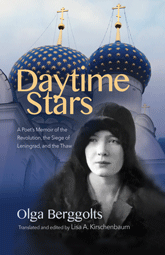|
Daytime Stars
A Poet's Memoir of the Revolution, the Siege of Leningrad, and the Thaw
Olga Berggolts, Translated and edited by Lisa A. Kirschenbaum; Foreword by Katharine Hodgson
“Without them, without these daytime stars, I am not and cannot be a writer.”
For 872 days during World War II, the city of Leningrad endured a crushing blockade at the hands of German forces. Close to one million civilians died, most from starvation. Amid the devastation, Olga Berggolts broadcast her poems on the one remaining radio station, urging listeners not to lose hope. When the siege had begun, the country had already endured decades of revolution, civil war, economic collapse, and Stalin's purges. Berggolts herself survived the deaths of two husbands and both of her children, her own arrest, and a stillborn birth after being beaten under interrogation.
Berggolts wrote her memoir Daytime Stars in the spirit of the thaw after Stalin's death. In it, she celebrated the ideals of the revolution and the heroism of the Soviet people while also criticizing censorship of writers and recording her doubts and despair. This English translation by Lisa A. Kirschenbaum makes available a unique autobiographical work by an important author of the Soviet era. In her foreword, Katharine Hodgson comments on experiences of the Terror about which Berggolts was unable or unwilling to write.
Olga Berggolts (1910–75) was a Soviet poet, writer, playwright, and journalist. Lisa A. Kirschenbaum is a professor of history at West Chester University and the author of International Communism and the Spanish Civil War, Small Comrades, and The Legacy of the Siege of Leningrad, 1941–1995.
Praise
“A lyrical memoir steeped in the world of the Russian/Soviet intelligentsia. Berggolts opens up to her readers the gray zones of Soviet life.”
—Benjamin Nathans, author of Beyond the Pale
“A compelling work and an interesting window onto a Soviet life, extending from a childhood during the civil war to the youthful revolutionary in Petrograd/Leningrad, from the terror of the 1930s and the siege of Leningrad to the present of the text, 1953–62.”
—Emily van Buskirk
“Illustrates how faith and doubt could coexist. . . . Kirschenbaum underscores how these dual states inspired literary innovation. Berggolts commands us to grapple with the complexity of Soviet experiences and storytelling.”
—The Russian Review
|

Larger images
August 2018
LC: 2017049163 PG
224 pp. 6 x 9
10 b/w illus.
|

